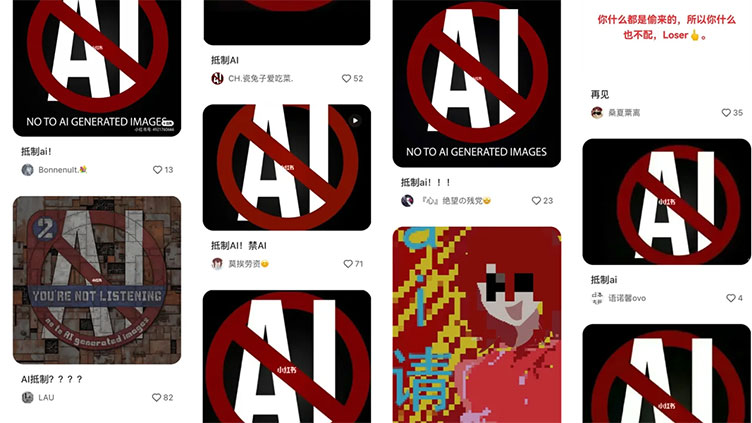Chinese artists boycott big social media platform over AI-generated images

Technology
The controversy erupted just weeks after China unveiled rules for generative AI
(Web Desk) - Artists across China are boycotting one of the country’s biggest social media platforms over complaints about its AI image generation tool.
The controversy began in August when an illustrator who goes by the name Snow Fish accused the privately owned social media site Xiaohongshu of using her work to train its AI tool, Trik AI, without her knowledge or permission.
Trik AI specializes in generating digital art in the style of traditional Chinese paintings; it is still undergoing testing and has not yet been formally launched.
Snow Fish, whom CNN is identifying by her Xiaohongshu username for privacy reasons, said she first became aware of the issue when friends sent her posts of artwork from the platform that looked strikingly similar to her own style: sweeping brush-like strokes, bright pops of red and orange, and depictions of natural scenery.
“Can you explain to me, Trik AI, why your AI-generated images are so similar to my original works?” Snow Fish wrote in a post which quickly circulated online among her followers and the artist community.
The controversy erupted just weeks after China unveiled rules for generative AI, becoming one of the first governments to regulate the technology as countries around the world wrestle with AI’s potential impact on jobs, national security and intellectual property.
Trik AI and Xiaohongshu, which says it has 260 million monthly active users, do not publicize what materials are used to train the program and have not publicly commented on the allegations.
The companies have not responded to multiple requests from CNN for comment.
But Snow Fish said a person using the official Trik AI account had apologized to her in a private message, acknowledging that her art had been used to train the program and agreed to remove the posts in question. CNN has reviewed the messages.
However, Snow Fish wants a public apology. The controversy has fueled online protests on the Chinese internet against the creation and use of AI-generated images, with several other artists claiming their works had been similarly used without their knowledge.
Hundreds of artists have posted banners on Xiaohongshu saying “No to AI-generated images,” while a related hashtag has been viewed more than 35 million times on the Chinese Twitter-like platform Weibo.
The boycott in China comes as debates about the use of AI in arts and entertainment are playing out globally, including in the United States, where striking writers and actors have ground most film and television production to a halt in recent months over a range of issues — including studios’ use of AI.
Many of the artists boycotting Xiaohongshu have called for better rules to protect their work online — echoing similar complaints from artists around the world worried about their livelihoods.
These concerns have grown as the race to develop AI heats up, with new tools developed and released almost faster than governments can regulate them — ranging from chatbots such as OpenAI’s ChatGPT to Google’s Bard.
China’s tech giants, too, are rapidly developing their own generative artificial intelligence, from Baidu’s ERNIE Bot launched in March to SenseTime’s chatbot SenseChat.

